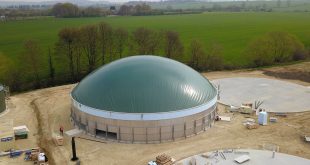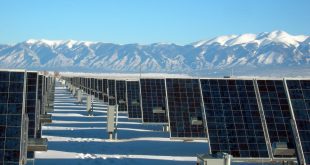Pew Delivers Clean Energy Recommendations to Administration and Congress
The domestic clean energy economy needs national policies to innovate, manufacture, and compete
The global clean energy marketplace is expanding rapidly, but the competitive position of American industry is at risk because of increased competition abroad and uncertain policies at home, according to a report released today by The Pew Charitable Trusts.
The study, Innovate, Manufacture, Compete: A Clean Energy Action Plan, states that revenue in the clean energy sector worldwide could total $1.9 trillion from 2012 to 2018. Yet roundtable discussions with more than 100 U.S. industry leaders reveal that the country is at a crossroads: Private investment, manufacturing, and deployment of renewable power have been constrained because of the lack of a long-term, consistent energy policy. To strengthen America’s global competitiveness in this growing economic sector, the report outlines policy recommendations, including investments in energy research and development, extension of key manufacturing incentives, and establishment of a national Clean Energy Standard that sets milestones for deployment of renewable and other clean sources in the electric power sector.
“Industry is telling us in no uncertain terms that the United States needs to adopt clear, consistent, long-term energy policies that allow American businesses to thrive, make our country more energy secure, and advance environmental imperatives,” said Phyllis Cuttino, director of Pew’s Clean Energy Program. “Our research shows that there is a multi-trillion-dollar opportunity in the clean energy sector. U.S. industry has the capacity to be a leader, provided we have the right policies in place. It’s time for Congress to support a comprehensive energy strategy by delivering long-term certainty for businesses and investors in renewable power.”
Clean energy markets are large and growing, offering the United States an important opportunity for innovation, investment, job creation, and manufacturing. Pew’s research projects that revenue associated with installation of wind, solar, and other renewable power is expected to grow at a compound annual rate of 8 percent, rising from $200 billion in 2012 to $327 billion annually by 2018. In the United States, clean energy installations are projected to reach 126 GW, which would more than double non-hydroelectric generating capacity.
The U.S. position in the industry is constrained by numerous challenges, including tight credit markets, growing international competition, and an uneven playing field with fossil energy sources. “It’s difficult to get funding today,” said Jeff Metts, president of Astraeus Wind Energy, which makes turbine components. “We need some stability in this market.”
Aaron LeMieux, founder and chief executive of Tremont Electric, said: “To compete effectively for clean energy jobs and manufacturing, the United States must adopt national policies that stimulate diverse domestic clean energy investments and production.”
Pragmatic federal clean energy policies would help enhance the competitive position of the U.S. renewable power industry. Throughout the past year, Pew has conducted research and consulted business leaders and industry experts across the country to evaluate strategies for strengthening the sector and improving America’s position in the global clean energy race. Based on this input and empirical research, the report recommends that the United States:
- Establish a clean energy standard to guide deployment and investment for the long term.
- Significantly increase investment in energy research and development.
- Enact a multiyear but time-limited extension of tax credits for clean energy sources.
- Level the playing field across the energy sector by evaluating barriers to competition.
- Renew incentives for domestic clean energy manufacturing.
- Create a strategy to expand markets for clean energy goods and services abroad.
Pew’s research in developing these recommendations included empirical data by Pike Research, a leading market research firm that provides in-depth analysis of global clean energy technology markets, and qualitative evidence gathered through roundtable discussions with stakeholders across the country and at a Washington, DC, conference featuring panels of experts and more than 100 members of Pew’s Clean Energy Business Network.
Read the entire report at www.PewTrusts.org/
The Pew Clean Energy Program seeks to accelerate the clean energy economy for national security, economic, and environmental benefits. Pew’s Clean Energy Business Network is an association of more than 3,700 business leaders representing all aspects of the clean energy economy. Member companies are building the infrastructure necessary for a more prosperous future that provides jobs and opportunity for everyone. www.PewTrusts.org/
The Pew Charitable Trusts is driven by the power of knowledge to solve today’s most challenging problems. Pew applies a rigorous, analytical approach to improve public policy, inform the public, and stimulate civic life. www.PewTrusts.org
 Alternative Energy HQ solar power for homes, wind energy, and bio fuel issues
Alternative Energy HQ solar power for homes, wind energy, and bio fuel issues


 US urged to capitalise on hundreds of billions in renewable energy investment
US urged to capitalise on hundreds of billions in renewable energy investment







